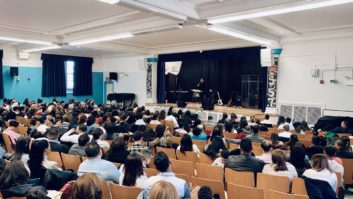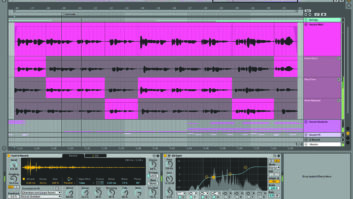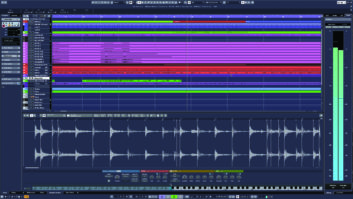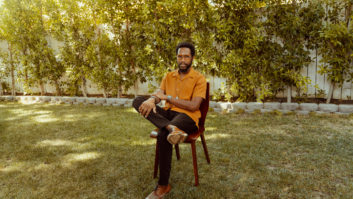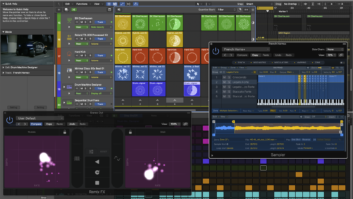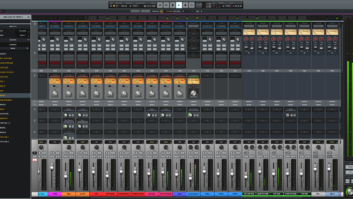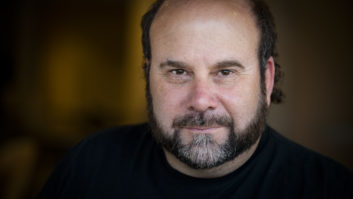
The Record Company continues its meteoric ascent with its sophomore effort, All of This Life, coming out in June on Concord Records. The band started out as countless others have, playing routine blues bars in Los Angeles, but something in the chemistry of this band was different. The debut album, Give it Back to You, was entirely self-produced, recorded in bass player Alex Stiff’s living room with modest and inexpensive gear—yet it landed a Grammy nomination. This time, with an even more ambitious collection of songs, the band aligned with veteran mix engineer Mark Needham, who took the sonics to a new level. To support the album, the group has embarked on a headline tour of midsized venues across the United States. Pro Sound News recently spoke to Stiff about harnessing one’s sound and playing with guts.
On the band’s sophomore effort
The first album was made entirely in my living room on really cheap equipment and I mixed it myself. We didn’t really know what to expect and it really blew past everyone’s expectations. To have the album go to radio and get nominated for Grammys was absolutely crazy. On this album, we started in the living room again for writing purposes—my house in Los Angeles is a great place, where we are comfortable. We wanted to be able to find that natural progression both sonically and songwriting-wise. During those sessions, I was in a car with my drummer and a Fleetwood Mac song came on. The drums were so good that it felt like Stevie Nicks was right in the room with me, singing to me. At that point, I knew we need to find a studio with a great drum sound to take this thing to the next level.
On Mark Needham
Mark Needham was fantastic—he really got it and started out just by mixing a song. Then we would say, ‘That was really good. Do you want to do another one?’ And this continued until he finished the whole album and did 10 songs. He even did some bonus tracks, too. He is a really hard worker, turned things around quickly, and I couldn’t recommend him more highly or give him higher praise.
On setting roots in L.A.
I moved to Los Angeles many years ago with the goal of making a living in music. When this band started, I had a lot of experience with making music, production and composition because I was writing commercial songs for TV and film. There is a lot that I learned in commercial composing, and I did it for well over a decade. I always had bands on the side, but they definitely weren’t paying the bills, so the commercial composing is how I was making a living. It helped having all this experience coming into the band.
On a “Life to Fix”
The single “Life to Fix” really surprised us. When we got the first mix from Mark Needham, it felt like a train just ran over us. We all kind of went, ‘Wow—that sounds big and huge, and in all the right places.” It also played well in a bunch of sonic environments. Our singer, Chris [Vos], said he was scared that our band made sound like this, that it had this kind of bigness. Not all the songs on the album are like this one—in fact, some are 6/8 ballads—but that particular song had this ‘four on the floor chug’ that really blew us all away. But that drum sound wasn’t right for all the tracks. For example, on certain things, we maybe needed a ’60s Ringo thing going. We paid close attention to all of that.
On finishing up
To some degree, you don’t ever know that a record is done. But for us, we had a certain number of tracks we really liked, and then we started to think about sequencing. And then, when we knew we had two or three more tracks to write, we would ask ourselves, ‘What does the album need? Does it need something about a particular lyrical topic, or do we need a song that goes a more bluesy or gritty route?’ By the time we were reaching the last few songs, we were really just challenging ourselves to make sure we really liked every single track. When we got to a place where we felt we really liked all the songwriting, we were going to start mixing. You get to that place, but only through the grind and the work and the writing and the recording.
On surpassing expectations
Who would think that three guys already in our 30s would make it by starting a blues-based group playing small bars in Los Angeles? What a joke that is nowadays, right? What I tell people is that the minute you really follow your heart on a musical level and go with your gut on how you want to write and play music, that’s when it clicks. For us, that is exactly the point when we found our audience.
It seemed like an insane thing to venture out on, playing the kind of music we were playing at the age we were, and to think it would succeed. But when we set up mics in my living room that first day we recorded, we said, ‘Wow, this sounds like something, and we’ve only been together for one day.’ Our sound was harnessed right from the beginning, and it was what we all wanted to do. When we went with our hearts and our guts, that’s when things started to work out for us.
